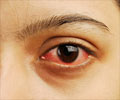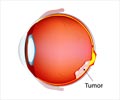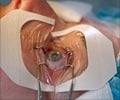The development and characterization of a comprehensive genetic test for inherited eye disorders was reported in the online version of the Nature journal Genetics In Medicine Thursday.

Gene panel-based tests for inherited eye disorders have been previously reported, but none of these have been as thoroughly characterized with regard to their performance in a diagnostic setting as the GEDi test. Stringent tests of accuracy and reproducibility showed that the GEDi test is both highly accurate and reproducible. This type of validation testing is recommended by the American College of Medical Genetics and Genomics, but few other genetic tests have been characterized in as much detail as the GEDi test. The results reported show that the GEDi test is 98 percent accurate at detecting spelling variations or mutations in the genetic code of inherited eye disease genes, and is highly reproducible between test runs. In contrast, the technique whole exome sequencing ― in which the coding regions of all genes are sequenced, and which is being employed commonly in clinical settings―was 88 percent accurate at detecting genetic variants in the same genes.
"The results we obtained for the GEDi test have broad implications and show that panel-based testing focused on the specific genes associated with genetic conditions offers important advantages over whole exome sequencing," said Janey Wiggs, M.D., Ph.D., director of the Genetic Diagnostic Testing Service of the OGI, and the Paul Austin Chandler Associate Professor of Ophthalmology, Harvard Medical School.
Investigators in the OGI and other centers around the United States and the world are optimistic that treatments targeting the underlying genetic cause of inherited eye disorders can be applied broadly to preserve vision. One especially promising approach is gene therapy, in which a correct copy of the misspelled or mutant gene responsible for disease is added to the affected cells in the retina. Reports of early results from clinical trials of gene therapies for two inherited retinal degenerative disorders have shown that this treatment can be performed safely, and that subjects treated in these trials experienced significant improvements in or preservation of vision. Clinical trials of gene therapies for three additional genetic forms of inherited retinal degeneration are currently in progress, and more are on the way. Given the potential of gene and genetic therapies, improved genetic diagnostic testing for patients with genetic eye disorders such as that offered with the GEDi test is especially important.
About Massachusetts Eye and Ear
Mass. Eye and Ear clinicians and scientists are driven by a mission to find cures for blindness, deafness and diseases of the head and neck. After uniting with Schepens Eye Research Institute in 2011, Mass. Eye and Ear in Boston became the world''s largest vision and hearing research center, offering hope and healing to patients everywhere through discovery and innovation. Mass. Eye and Ear is a Harvard Medical School teaching hospital and trains future medical leaders in ophthalmology and otolaryngology, through residency as well as clinical and research fellowships. Internationally acclaimed since its founding in 1824, Mass. Eye and Ear employs full-time, board-certified physicians who offer high-quality and affordable specialty care that ranges from the routine to the very complex. U.S. News & World Report''s "Best Hospitals Survey" has consistently ranked the Mass. Eye and Ear Departments of Otolaryngology and Ophthalmology as among the top hospitals in the nation. Mass. Eye and Ear is home to the Ocular Genomics Institute which aims to translate the promise of precision medicine into clinical care for ophthalmic disorders. For more information about life-changing care and research, or to learn how you can help, please visit MassEyeAndEar.org.
Reference:
Consugar MB, Navarro-Gomez D, Place EM, Bujakowska KM, Sousa ME, Fonseca-Kelly ZD, Taub DG, Janessian M, Wang DY, Au ED, Sims KB, Sweetser DA, Fulton AB, Liu Q, Wiggs JL,Gai X, Pierce EA. Panel-based Genetic Diagnostic Testing for Inherited Eye Diseases is Highly Accurate and Reproducible and More Sensitive for Variant Detection Than Exome Sequencing. Genetics In Medicine, In Press. (*Co-first authors).
Advertisement
This work was supported by grants from the National Institutes of Health (EY012910, and P30EY014104), the March of Dimes and the Foundation Fighting Blindness.
Source-Newswise













